Little Ross island lighthouse keeper murder recalled
- Published
David Collin has been a regular visitor to Little Ross for more than 60 years
More than half a century ago, David Collin made a boat trip for a picnic with his father he will never forget.
On 18 August 1960, they set out for Little Ross island off Kirkcudbright in the family dinghy to explore the bay.
They would end up finding the body of a lighthouse keeper who had been killed by his colleague in a case which is still part of local folklore.
No wonder he is watching the current efforts to sell the island with more interest than most.
"I think it means a lot to everybody in Kirkcudbright, really, because we think of it as our island - we don't own it but it is our view," he said.
"It sits at the mouth of the bay in a very commanding position.
"In good weather it looks very tempting and in bad weather it's a shelter for visiting vessels and anybody entering the bay that anchors behind it.
"So it is important on a whole lot of different levels."
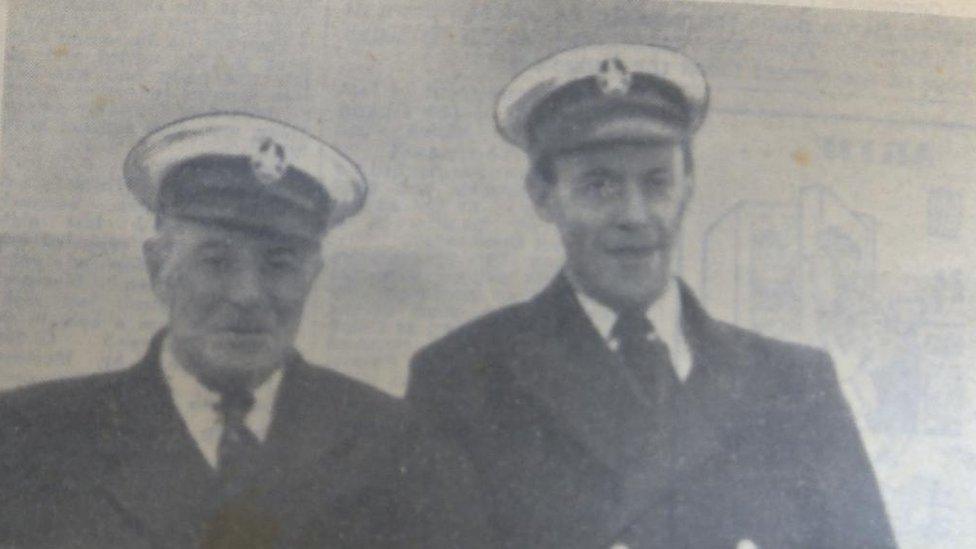
There was no sign of the lighthouse keepers Hugh Clark, left, and Robert Dickson, right, when Mr Collin arrived on Little Ross in 1960
However, the island is particularly significant to Mr Collin whose memories of his visit 57 years ago remained crystal clear while making another trip this week.
"There was a lot less wind on that day, we really just drifted down to the island dodging between sunny spells and the occasional shower," he recalled.
"My father was a banker in Kirkcudbright, he wasn't an experienced sailor - I was boat-daft and my father respected that and understood it so he eventually succumbed to pressure and bought a small family sailing dinghy.
"My father was never a seaman really. He wanted, however, to come to the Ross so I was essentially taking my father out."
It was his father's day off and with a decent weather forecast they set off on their expedition.
When they arrived on the island, things immediately felt a little bit different from previous trips.
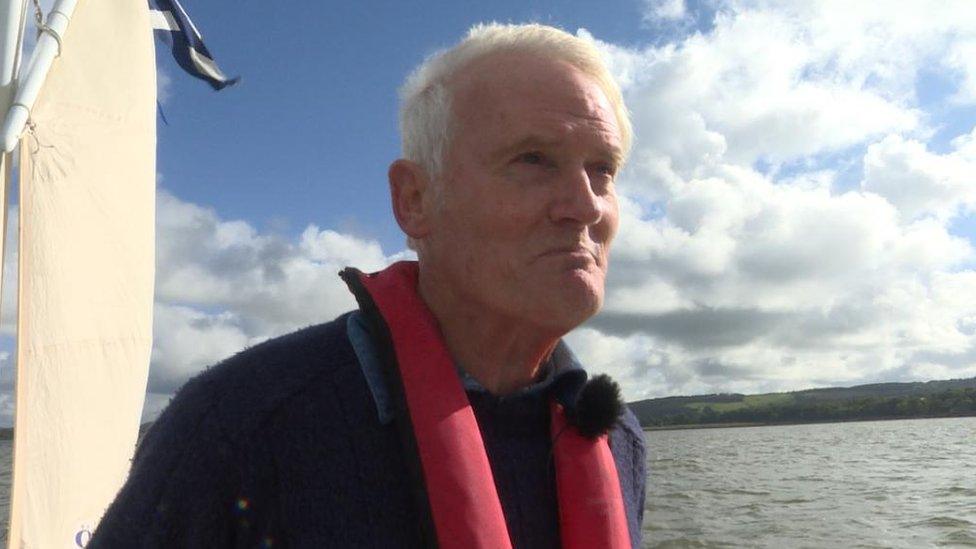
David Collin has been a regular visitor to Little Ross for more than 60 years
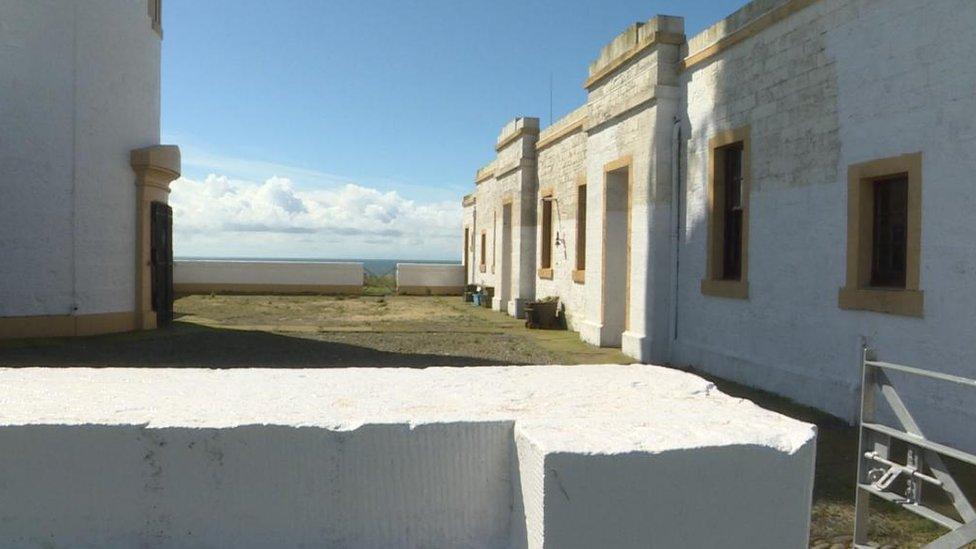
Mr Collin said they saw nothing "gory or macabre" on the island
"Both of us were surprised that there were no people in evidence, there were no keepers," said Mr Collin.
"Usually you saw the keepers somewhere but we thought perhaps they were asleep after being on watch half the night so we didn't pay too much attention."
They went up to the lighthouse tower to introduce themselves but got no answer and went for their picnic.
Later they heard a phone ringing which went unanswered, but it was only when it was almost time to leave that they checked the cottages.
'Fairly cautious'
"My father eventually plucked up courage and went into one of the houses, in fact we both went into the house on the right, the principal keeper's house," said the retired architect.
"Everything was spick and span, neat, clean, tidy, beautiful - a budgie singing in its cage - no sign of anybody.
"My father went into the second house - I didn't go in - but he quickly came running out and said: 'Get help if you can, there is a man ill in his bed'."
Mr Collin ran to the east quay where he knew two people were lobster fishing - one of them came ashore and all three went into the room.
"We found an elderly man lying in his bed...he was tucked up in his pyjamas and there was a towel beside his head, partially covering his head," he said.
"We didn't disturb him at all but we kind of got the impression he was dead, but we didn't really know and we didn't have medical expertise so we were fairly cautious."
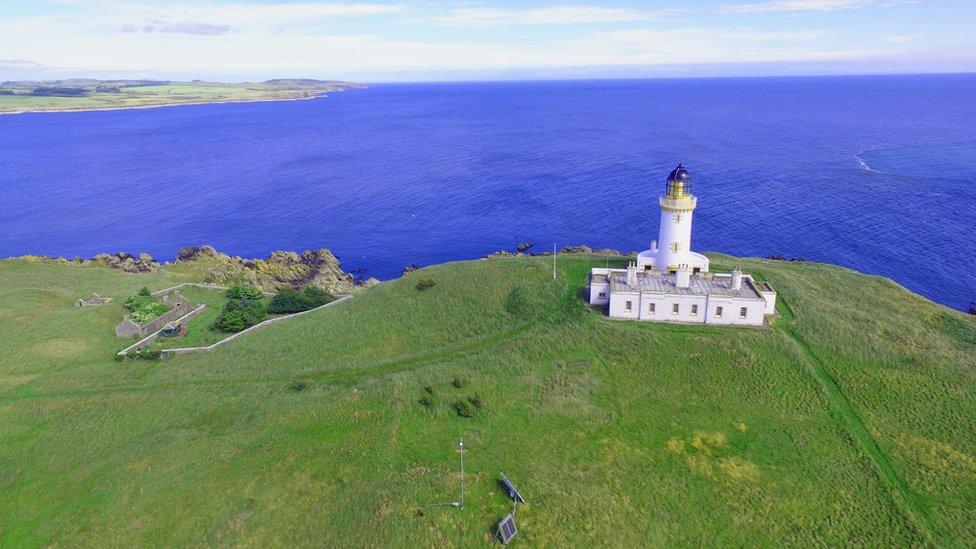
Many exaggerated stories of the murder have been told over the years, according to Mr Collin
His father phoned the police and the doctor in Kirkcudbright and they then waited for help to come.
"It never crossed our mind that we had discovered a murder - you don't think of murder on an August day on a remote island, it's the last thing that would enter your head," said Mr Collin.
"We thought that the man had perhaps fallen, perhaps taken ill and been put to bed by his fellow keeper.
"I think it was 16:00 we phoned the police and it was about 19:00 before anybody got to the island.
"We felt, chiefly, just sad that somebody had apparently died but we weren't apprehensive and we didn't see any evidence that led us to think there had been a murder."
It quickly emerged, however, that the lighthouse keeper had been killed.
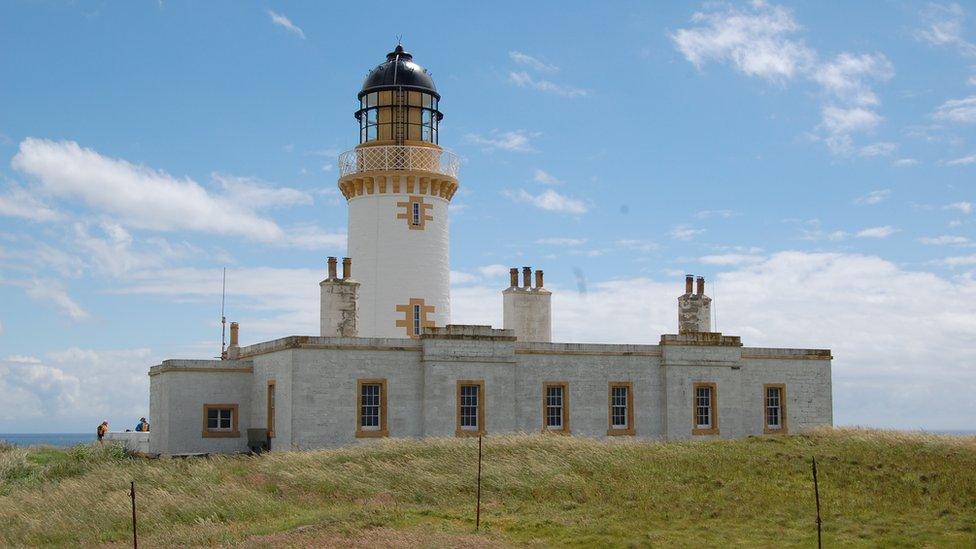
Little Ross is up for sale - lighthouse tower not included - for offers over £325,000
"We were very shocked - as I think everybody in Kirkcudbright was - we just found it difficult to reconcile with what we had found," explained Mr Collin.
"In fact, the relief keeper Hugh Clark had been shot by the assistant keeper Robert Dickson at very close range with a .22 rifle.
"There was no sign of an entry wound and, since we didn't turn him over, we didn't see the exit wound."
Dickson had fled the island but he was later arrested in Yorkshire and came to trial at the High Court in Dumfries.
The murder and subsequent court case grabbed the attention of the national media, generating lurid headlines and much misinformed speculation.
"We saw nothing gory or macabre - there were some bloodstains on the towel but nothing like the stories people in Kirkcudbright tell you," said Mr Collin.
"I have been reliably informed he was stabbed seven times in the chest, his throat was cut from ear to ear and that his face had been blown away by a shotgun.
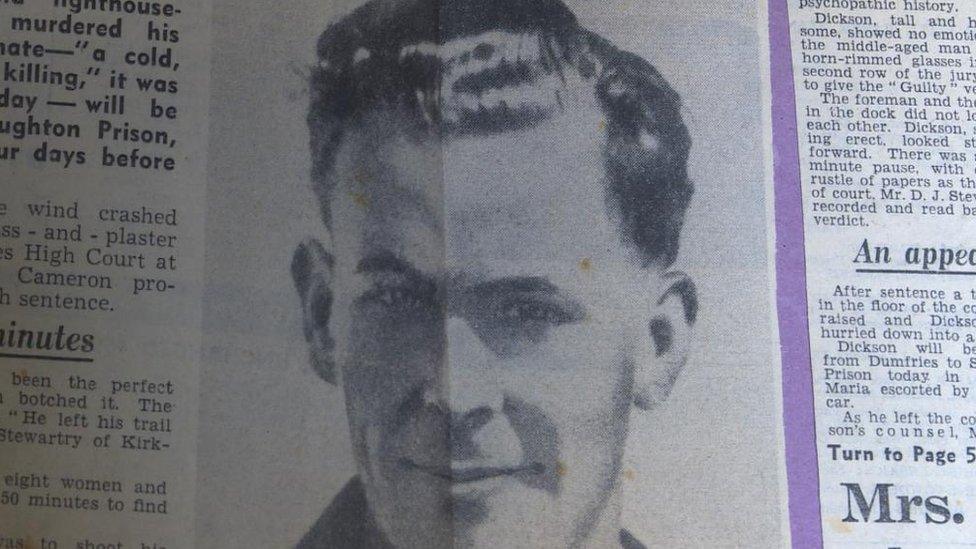
Robert Dickson's court case grabbed the attention of the national media
"All of this is complete, total nonsense - fabrication - but these stories caught everybody's attention and still do to this day."
Despite the experience, the 76-year-old said it had not put him off coming to an island he first visited when he was 15.
"My memory of that day is perhaps more of the principal keeper's beautiful little house - his friendly dog, his budgie in the cage, the neatness and tidiness that prevailed," he said.
"The Northern Lighthouse Board keepers were required to keep everything spick and span. Everything that could be polished was polished, everything was neat and tidy, they never knew when they were going to be inspected.
"Inspections reflected very badly on their future promotion prospects if they hadn't kept everything smart."
He was more troubled by the trial where, despite a defence plea of insanity, Dickson was convicted of capital murder and sentenced to hang.
Permanently haunted
"I sat through the whole court proceedings and whereas there was no doubt of the guilt of the accused equally, in my mind, and I think a great many other people's minds, there was no doubt he suffered from some form of mental illness," he said.
"He had a history of mental illness and the defence was insanity but the judge's direction to the jury, on legal grounds, was that he was guilty.
"I felt more troubled by seeing a young man sentenced to death in Dumfries surrounded by people that I knew, fellow witnesses and so on.
"I was far more troubled by that than actually finding the unfortunate victim which really wasn't that distressing - it was sad but not distressing.
"What permanently haunts me is having witnessed somebody sentenced to death, I found that horrific."
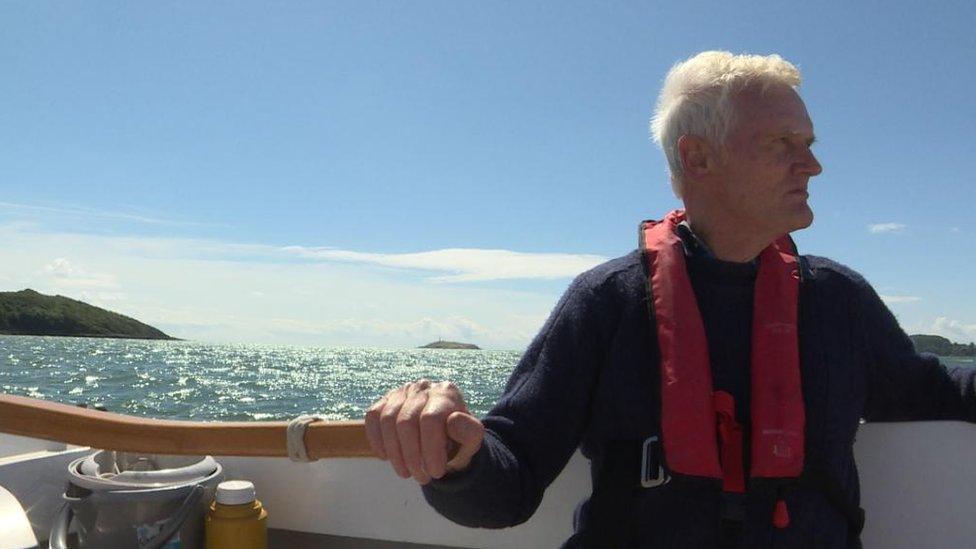
The retired architect said he hoped the island found a "caring owner"
That death penalty was later commuted to life in prison but Dickson took his own life in jail.
And, after so many years, what would Mr Collin like to see happen to the island which selling agents Galbraith have described as a "once-in-a-lifetime" opportunity?
"I'd like to see it find a caring owner who wouldn't alter very much," he said.
In the meantime, he will carry on visiting an island which holds a special place in his affections.
"I always feel sad when I leave it," he said. "There is something about arrivals and departures - arrivals are happy, departures are nearly always sad.
"But I always look forward to the next time and there will be many next times I'm sure."
- Published14 July 2017
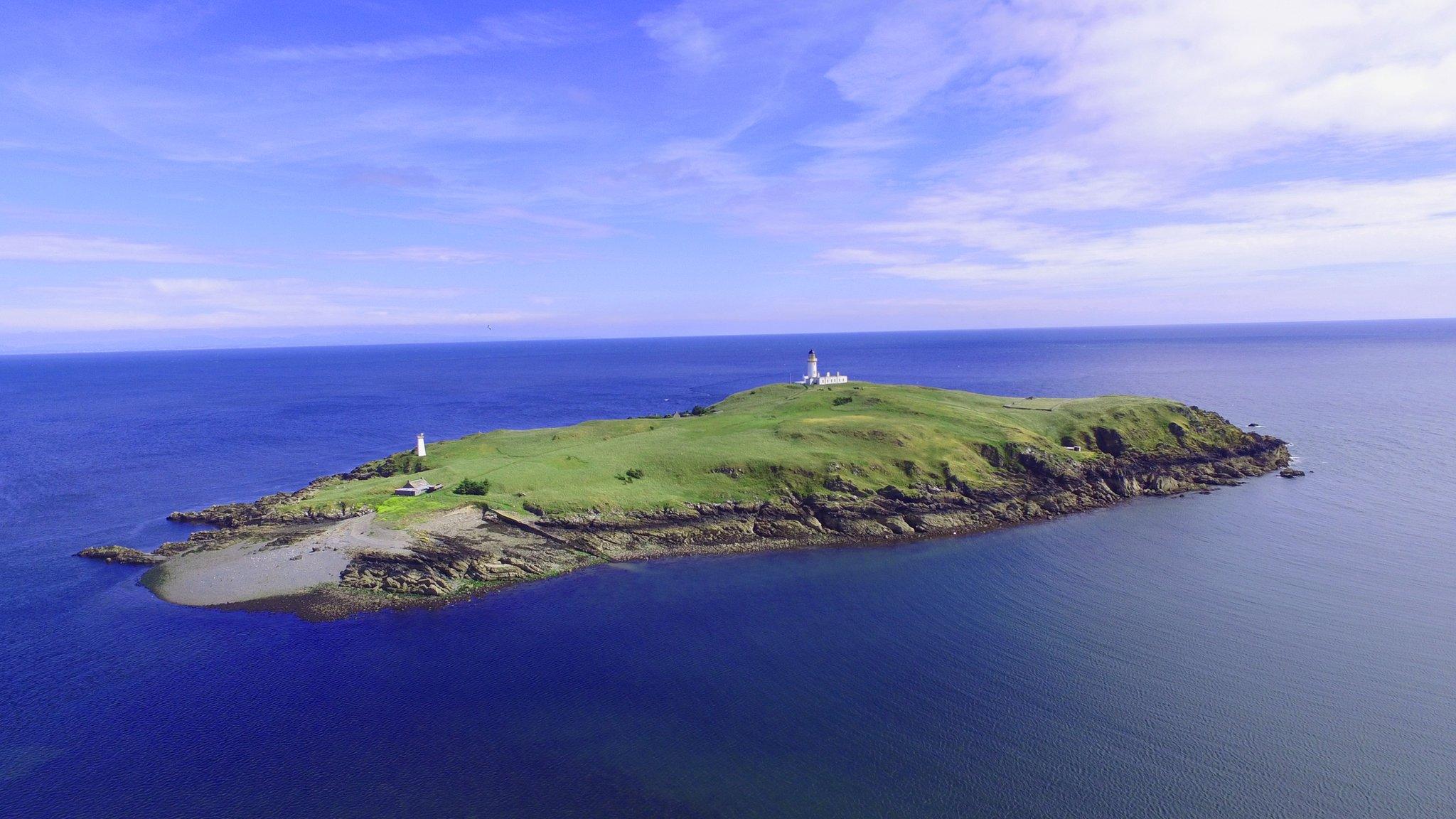
- Published3 February 2015

- Published1 April 2013
